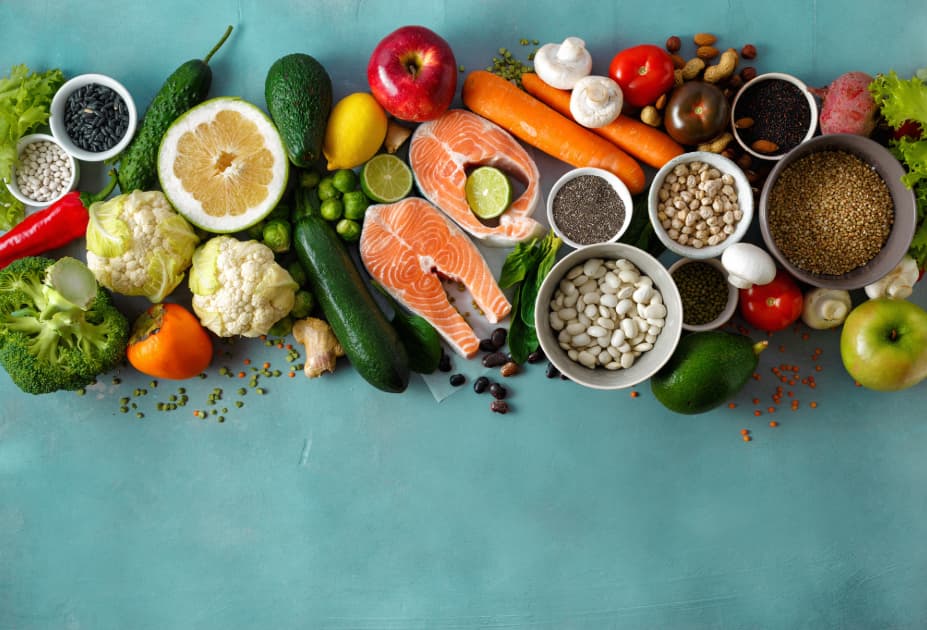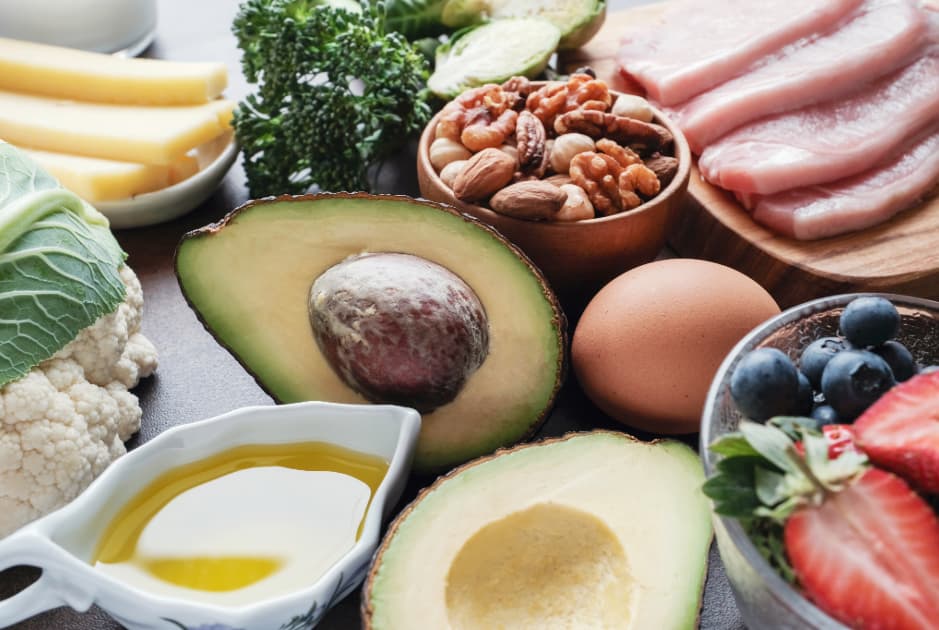
Living Up
Lessons to level up your life
Understanding nutrition is not just about counting calories or restricting certain foods—it’s about nourishing your body and mind with the right balance of nutrients to support your overall health and well-being. By following a balanced diet that includes a variety of foods from all food groups, you can ensure that you are getting the essential nutrients your body needs to function optimally.


It’s important to understand the above essential nutrients fall into the categories of macronutrients and micronutrients. The first four essential nutrients in the list are found in these categories as you read, the last three are weaved into all the categories as it pertains to each individual food type.
Macronutrients are the essential nutrients that we need in large quantities to provide us with energy and support our body’s functions. Micronutrients may be needed in smaller amounts compared to macronutrients, but their impact on our health is no less significant.
The three main macronutrients are carbohydrates, proteins, and fats.
Vitamins (fat-soluble or water-soluble) play significant roles in supporting immunity, vision health, growth, and many other functions.
Minerals are crucial for body functions such as bone strength, muscle function, nerve transmission, and fluid balance.
Ensuring a balanced intake of both macronutrients (balancing carbs, fats, and proteins) and micronutrients (vitamins, minerals) is key to maintaining overall health, status quo should always be guided by your healthcare provider or nutritionist to ensure individual needs/preferences/limitations under consideration.
Macronutrients are essential components of our diet. The three main macronutrients are carbohydrates, proteins, and fats.
Understanding macronutrients is key to maintaining a balanced diet since they provide the foundation for meeting your daily nutritional needs. Carbohydrates fuel your daily activities; proteins help build muscle tissue, and healthy fats support brain function. Adding a variety of these macronutrients to your meals can improve your overall health as well as give you the energy you need to thrive each day!
Carbohydrates are a primary source of energy for our bodies, providing fuel for daily activities, our brains, and our muscles. Carbohydrates can be found in foods like bread, pasta, rice, and fruits. Carbs come in two main forms: simple carbohydrates and complex carbohydrates.
It’s important to strike a balance between simple and complex carbohydrates in your diet. While indulging in sweets every now and then is perfectly fine, relying too heavily on simple sugars can lead to spikes and crashes in blood sugar levels, leaving you feeling sluggish and irritable.
Simple carbs are sugars that break down and digest quickly in the body, giving us a quick burst of energy. Think of foods like candy, soda, table sugar, honey, fruit juices, and pastries – they’re loaded with simple sugars that can spike our blood sugar levels rapidly.
These carbohydrates are made up of one or two sugar units, which is why they are also referred to as “simple sugars.” When you consume these foods your blood sugar levels spike quickly followed by a sudden crash, simple carbs’ major drawback is the impact on blood sugar levels, causing a rapid rise in blood glucose levels that triggers the release of insulin from the pancreas to help regulate blood sugar levels.
Frequent consumption of simple carbohydrates can lead to insulin resistance over time, increasing the risk of type 2 diabetes and other metabolic disorders. It’s essential to understand that not all sources of simple carbohydrates are created equal.
While some foods containing simple sugars offer little to no nutritional value and are often referred to as “empty calories,” others come with added benefits. For example, fruits contain natural sugars like fructose but also provide essential vitamins, minerals, and fiber that contribute to overall health.
Opting for whole fruit over fruit juices or sugary snacks can help mitigate the negative effects associated with consuming excessive simple carbohydrates. To maintain stable energy levels and support overall health.
Relying heavily on foods high in simple sugars can lead to fluctuations in energy levels and potential long-term health issues. Balancing your diet with complex carbohydrates like whole grains, fruits, vegetables, and lean proteins can provide sustained energy while offering essential nutrients for optimal well-being.
Unlike simple carbohydrates that can cause rapid spikes in blood sugar levels, complex carbohydrates are digested more slowly and take longer to break down due to their more intricate chemical structure helping to maintain stable energy levels throughout the day.
Foods like whole grains, fruits, and vegetables fall into this category. They provide a steady release of energy over time and are packed with essential nutrients like fiber, vitamins, and minerals promoting overall health.
One of the main sources of whole grains include foods like whole wheat bread, brown rice, quinoa, and oats. Whole grains are rich in fiber, vitamins, and minerals. They provide sustained energy, support digestive health, and reduce the risk of chronic diseases such as heart disease and diabetes.
Vegetables are another great source of complex carbohydrates. From leafy greens like spinach and kale to starchy vegetables like sweet potatoes and carrots, there is a wide variety to choose from. Vegetables not only contain complex carbs but also pack a powerful punch of essential nutrients like vitamins A and C, potassium, and fiber.
Incorporating a colorful array of vegetables into your meals ensures you’re getting a diverse range of essential nutrients along with those beneficial complex carbs. Legumes such as beans, lentils, and chickpeas are also excellent sources of complex carbohydrates.
Legumes are versatile ingredients that can be used in soups, salads, stews, or even blended into dips like hummus. They are also high in protein, making them an ideal choice for vegetarian or vegan diets.
Adding legumes to your meals not only boosts the nutritional content but also contributes to satiety and helps regulate blood sugar levels effectively. Ensuring meals with a more stable release of energy while supplying your body with vital nutrients is the goal of a balanced diet. When choosing carbohydrates to include in your diet, opt for whole food sources as much as possible.
Fruits and vegetables are also excellent sources of carbs that provide an array of vitamins, minerals, antioxidants, and fiber – all essential for supporting your overall health and well-being. Opting for whole grains, vegetables, and legumes can make a significant difference in how you feel day-to-day. So next time you’re planning your meals, remember to include these nutrient-dense foods for a healthier lifestyle!
Proteins play a crucial role in maintaining overall health and well-being. Often referred to as the building blocks of life, protein is essential for the growth, repair, and maintenance of tissues in the body. Proteins are made up of amino acids that are the building blocks that our body uses to build and repair muscles, organs, skin, hair, and other tissues.
There are 20 different types of amino acids that can combine in various ways to form different proteins. Nine of these amino acids are considered essential because our bodies cannot produce them on their own – we must obtain them through our diet. There are two main types of proteins: complete proteins and incomplete proteins.
Foods that contain all nine essential amino acids are known as complete proteins and include animal-based sources like meat, fish, poultry, eggs, and dairy products.
Incomplete proteins lack one or more essential amino acids and are typically found in plant-based sources like quinoa, soybeans, chia seeds, beans, lentils, nuts, seeds, and grains. However, combining different plant-based protein sources can help create a complete protein profile.
Enzymes are specialized proteins that catalyze chemical reactions necessary for digestion and metabolism. Proteins also help transport essential nutrients throughout the body and contribute to immune function by producing antibodies that defend against infections. Antibodies are proteins produced by the immune system to help defend against harmful pathogens.
Hormones like insulin and glucagon are also made up of protein structures that regulate blood sugar levels.
Additionally, they provide a sense of fullness and satiety after meals, which can aid in weight management by reducing overall calorie intake. It’s important to consume an adequate amount of protein each day to support these vital functions.

When it comes to understanding nutrition, it is important to understand the types of fat and their impact on health. Fats are often misunderstood and unfairly villainized about what’s good for you and what’s not. The truth is, that fats are an essential part of a balanced diet. Let’s break it down so you can make informed choices for your diet.
There are different types of fats, saturated fats, unsaturated fats, trans fats, polyunsaturated fats, and omega-3 and omega-6 fatty acids.
Saturated fats, explained below are commonly found in animal products and some plant-based oils. They have been linked to an increased risk of heart disease and other health issues when consumed in excess. They are still important for various bodily functions such as hormone production and cell structure, and it’s best to limit your intake of saturated fats whenever possible.
Unsaturated fats are considered heart-healthy and may lower your risk of heart disease when consumed in moderation. Found in foods like avocados, nuts, seeds, and olive oil.
Trans fats are artificially created fats through a process called hydrogenation, often found in processed foods like fried snacks, baked goods, and margarine. Trans fats can raise bad cholesterol levels while also lowering good cholesterol levels – a double whammy for your heart health, making them a major culprit in heart disease.
It’s best to avoid trans fats altogether by checking food labels for partially hydrogenated oils. Incorporating a variety of healthy fats into your diet is crucial for optimal health.
Polyunsaturated are also healthy in moderation and can be found in fatty fish like salmon and walnuts.
The omega fatty acids are a type of polyunsaturated fat that is essential for brain function and overall health.
These fats are typically solid at room temperature and are found in foods like butter, cheese, and red meat. Some can be harmful to your health and others can actually have some benefits. For example, coconut oil contains saturated fats called medium-chain triglycerides (MCTs), which have been shown to have potential health perks like boosting metabolism and aiding in weight loss.
Consuming too much saturated fat can lead to an increase in LDL cholesterol levels, which is often referred to as “bad” cholesterol, which contributes to heart disease and other health issues.
A general recommendation for how much saturated fat you should be consuming is to keep it limited to no more than 10% of your daily caloric intake. This means that in a 2,000-calorie diet your maximum per day is 22 grams of saturated fat per day.
Instead of completely cutting out saturated fats from your diet, focus on incorporating them in moderation while also including plenty of unsaturated fats from sources like avocados and olive oil. It’s all about making smart choices that support your overall health and well-being!
There are two main types of unsaturated fats: monounsaturated fats and polyunsaturated fats. Both monounsaturated and polyunsaturated fats, are typically found in plant-based oils like olive oil, avocados, and nuts. These types of fats can actually help improve your cholesterol levels by increasing HDL (“good”) cholesterol while lowering LDL cholesterol.
Unsaturated fats are typically found in plant-based foods and oils, as well as in fatty fish. These fats are known to have a beneficial impact on heart health when consumed in moderation.
These fats also play a role in brain function and reducing inflammation in the body. Including more unsaturated fats in your diet can help improve your cholesterol levels and support overall heart health
These fats have been linked to lowering bad cholesterol levels and reducing the risk of heart disease. Polyunsaturated fats include omega-3 and omega-6 fatty acids, which are essential for brain function and cell growth. Common sources are found in fatty fish like salmon and mackerel as well as flaxseeds and walnuts.
Omega-3s have anti-inflammatory properties that can help reduce the risk of chronic diseases such as heart disease and arthritis when consumed regularly as part of a balanced diet.
Incorporating more unsaturated fats into your diet can have numerous health benefits. Not only do these fats help lower bad cholesterol levels, but they also play a role in reducing inflammation in the body. Inflammation is linked to various chronic diseases, so consuming foods rich in unsaturated fats can help protect against these conditions.
While unsaturated fats are considered healthy choices, it’s important to remember that moderation is key. Consuming too much fat of any kind can lead to weight gain and other health issues.
Aim to replace saturated and trans fats with unsaturated fats in your diet to reap the benefits without overdoing it. Nutrition is all about balance, by making simple swaps like using olive oil instead of butter or snacking on nuts instead of chips, you can easily increase your intake of beneficial unsaturated fats for better overall health.
By being mindful of your portions and choosing healthier sources you can easily stay within this guideline. Remember that fat is an essential macronutrient that provides energy and helps with nutrient absorption.
By choosing the right types of fat in moderation, you can support your overall well-being while enjoying delicious meals that nourish your body from the inside out.

Now, let’s dive into the fascinating world of micronutrients. These tiny powerhouses may be needed in smaller amounts compared to macronutrients, but their impact on our health is no less significant.
First up, we have vitamins as essential micronutrients. There are fat-soluble vitamins, such as Vitamin A, D, E, and K, that are absorbed along with fats in the diet and are stored in the body’s fatty tissues. And water-soluble vitamins like Vitamin C and B-complex vitamins that are not stored in the body to the same extent as fat-soluble ones. Instead, they need to be replenished regularly through our diet.
Some vitamins work in conjunction with minerals to support the way the body absorbs them. For example, vitamin D is essential for calcium absorption and bone health, highlighting the interconnectedness of these essential nutrients.
Next on our list of micronutrients are minerals. These inorganic substances are just as important as vitamins for good health. Minerals are categorized into major and trace minerals.
Major Minerals examples include calcium, potassium, magnesium, sodium, and phosphorus, needed in larger amounts by the body. These minerals play key roles in bone health, muscle function, nerve transmission, and fluid balance.
On the flip side, trace minerals such as iron, zinc, copper, and selenium are required only in small amounts but are equally essential for various metabolic processes. Trace minerals are equally important for processes like enzyme activity and antioxidant defense.
A deficiency or excess of any micronutrient can lead to various health issues ranging from fatigue and weakened immunity to more severe conditions like anemia or osteoporosis. It’s crucial to understand that micronutrients work synergistically with each other and with macronutrients to support our overall well-being.
Incorporating a wide range of colorful fruits and vegetables into your diet can help ensure you’re getting a diverse array of vitamins and minerals. For instance, leafy greens like spinach provide iron for energy production while citrus fruits like oranges offer vitamin C for immune support. Fruits, vegetables, whole grains, lean proteins, nuts/seeds – all of these food groups contribute different essential nutrients that collectively support your overall well-being.
By being mindful of your nutrient intake from various food sources each day, you can optimize your health by providing your body with the essential building blocks it needs to thrive. Think colorful fruits and vegetables for a variety of vitamins and minerals or nuts and seeds for those important trace minerals like zinc and selenium.
These organic compounds are required by our bodies in small amounts, but essential. The two main categories, as stated before, are fat-soluble and water-soluble. In a balanced diet, each vitamin serves a specific purpose in the body, from supporting immune function to aiding in energy production.
Known as fat-soluble because they dissolve in fats and oils, these vitamins are stored in the body’s fatty tissues. The four main fat-soluble vitamins are vitamins A, D, E, and K.
Vitamin A is important for vision, immune function, and skin health. Is essential for good vision, immune function, and healthy skin and is commonly found in foods like carrots, sweet potatoes, spinach, and liver.
Vitamin A helps maintain the integrity of epithelial tissues – the skin and mucous membranes that act as barriers to infection. Deficiency in vitamin A can lead to night blindness and an increased susceptibility to infections.
Vitamin D is often referred to as the “sunshine vitamin” because our bodies can synthesize it when exposed to sunlight. This vitamin is crucial for calcium absorption and bone health.
In addition to sunlight exposure, dietary sources of vitamin D include fatty fish like salmon and mackerel, egg yolks, and fortified foods like dairy products. Deficiency can result in weakened bones (osteoporosis) or a condition known as rickets in children.
Vitamin E acts as an antioxidant in the body, protecting cells from damage caused by free radicals. It also plays a role in immune function and skin health.
Nuts (such as almonds and sunflower seeds), seeds (like pumpkin seeds), spinach, and avocado are good sources of vitamin E. Incorporating these foods into your diet can help ensure you’re getting an adequate intake of this important vitamin.
Vitamin K is necessary for blood clotting and bone metabolism.
Leafy greens such as kale and spinach are rich sources of vitamin K1 (phylloquinone), while fermented foods like natto provide vitamin K2 (menaquinone). Ensuring you have enough vitamin K in your diet supports proper blood coagulation processes and helps maintain healthy bones over time.
Water-soluble vitamins essential nutrients include vitamin C and the B-complex vitamins, such as B1 (thiamine), B2 (riboflavin), B3 (niacin), B5 (pantothenic acid), B6 (pyridoxine), B7 (biotin), B9 (folate or folic acid), and B12 (cobalamin). Unlike fat-soluble vitamins which are stored in the body’s fatty tissues, water-soluble vitamins dissolve in water and are not stored by the body, therefore, they need to be consumed regularly through diet or supplementation.
Vitamin C is known for its antioxidant properties and its role in collagen synthesis. Also known as ascorbic acid, is a powerful antioxidant that helps protect cells from damage caused by free radicals. It plays a vital role in wound healing and boosting the immune system. Good food sources of vitamin C include citrus fruits like oranges and grapefruits, strawberries, kiwi, bell peppers, and broccoli.
The B-complex vitamins play various roles in energy metabolism, nerve function, red blood cell production, and more.
The B-complex vitamins are a group of nutrients that work together to support various functions in the body. For example, thiamine (B1) helps convert carbohydrates into energy, riboflavin (B2) plays a role in metabolism and energy production, while niacin (B3) is important for digestive health.
These vitamins can be found in foods like whole grains, eggs, nuts and seeds, meat, poultry, fish, dairy products, and leafy green vegetables. Folate or folic acid is essential for cell division and growth.
It is especially important during pregnancy to prevent neural tube defects in developing babies. Sources of folate include dark leafy greens like spinach and kale, legumes such as lentils and chickpeas, avocado, and citrus fruits like oranges and grapefruits.
Vitamin B12 is necessary for red blood cell formation and neurological function. It is mainly found in animal products like meat, fish, eggs, milk, and yogurt, making it important for vegetarians to consider supplementation or fortified foods to meet their needs.
It’s important to include a variety of foods in your diet that provide a good mix of these essential vitamins to ensure you’re meeting your daily requirements. While deficiencies in certain vitamins can lead to health problems over time, it’s also possible to consume too much of certain fat-soluble vitamins which can be harmful. Consulting with a healthcare provider or nutritionist can help you determine the right balance of vitamin intake based on your individual needs and lifestyle factors.

These are the heavyweights of the mineral world as our bodies need relatively larger quantities of them to function properly including maintaining proper fluid balance, supporting bone health, and aiding in nerve function, compared to trace minerals. Think along the lines of calcium, potassium, magnesium, sodium, phosphorus, and chloride.
Despite being needed in smaller amounts, trace minerals are equally important. Some examples include iron, zinc, copper, selenium, iodine, and manganese.

Water is often overlooked when discussing nutrition, but it plays a crucial role in maintaining overall health and well-being. Our bodies are made up of about 60% water, which speaks to its importance in various bodily functions.
Staying adequately hydrated is essential for maintaining proper digestion, nutrient absorption, circulation, and temperature regulation. Think of water as the unsung hero of your body’s operation—it may not get the spotlight like other nutrients, but it’s just as vital.
When it comes to water consumption, the general recommendation is to aim for about 8-10 cups a day for adults. However, individual needs can vary based on factors like activity level, climate, and overall health.
Drinking enough water throughout the day helps prevent dehydration, which can lead to symptoms like headaches, fatigue, and even confusion. Keep a reusable water bottle with you to make it easier to stay hydrated consistently.
In addition to plain water, you can also hydrate through foods with high water content such as fruits (e.g., watermelon and oranges) and vegetables (e.g., cucumbers and tomatoes). These foods not only contribute to your daily fluid intake but also provide essential vitamins and minerals that support overall health.
Herbal teas and infused waters are also great options for staying hydrated while adding some flavor variety throughout the day. Hydration isn’t just important during physical activity or hot weather—it’s a constant need that our bodies have regardless of the circumstances.
Pay attention to signs of dehydration like dark urine or feeling thirsty, as these are signals that your body needs more water. By making a conscious effort to prioritize hydration in your daily routine, you’re giving your body one of the most fundamental elements it needs to function optimally.
Embrace the rainbow on your plate by incorporating a colorful array of fruits and vegetables, whole grains, lean proteins, and healthy fats into your meals. Being mindful of your dietary choices and aiming for a well-rounded nutrient profile that includes adequate amounts of both fat-soluble and water-soluble vitamins, can support your body’s optimal functioning and enhance your overall vitality. By doing so, you’ll fuel your body with essential nutrients and tantalize your taste buds with a diverse range of flavors and textures.
Don’t feel overwhelmed by trying to achieve perfection in every meal—small changes can lead to significant improvements in your overall health over time. Focus on progress rather than perfection and be kind to yourself throughout this journey towards better nutrition.
Remember that every bite you take is an opportunity to nourish yourself from within and show yourself some self-love through mindful eating practices. As you continue on your nutrition journey, approach it with curiosity and an open mind.
Experiment with new recipes, try different ingredients, and listen to how your body responds to various foods. Your relationship with food should be one of joy and empowerment rather than guilt or restriction.
Trust in the wisdom of your body’s signals and strive for a balanced approach that honors both physical nourishment and emotional satisfaction. With each mindful choice you make towards healthier eating habits, you are investing in a happier, healthier future for yourself—one delicious bite at a time. And don’t forget to hydrate, water is life!
.
One cannot think well, love well, sleep well, if one has not dined well.
– Virginia Woolf
Sources:
Virginia Woolf quote thanks to BrainyQuote.com







Seapoint Farms Dry Roasted Edamame snacks, sea salt, vegan, gluten-free, kosher, and non-GMO, crunchy source of protein snack for healthy snacking, 27oz. Jar

PLANTERS Unsalted Mixed Nuts, includes cashews, almonds, hazelnuts, pecans, and no shell pistachios. Perfect for party snacks, quick snack for adults, and after-school snacks. A source of plant-based protein, 34.5 Oz Container

Triple Strength Omega 3 Fish Oil 3600 mg, EPA & DHA, over 2100mg omega-3 fatty acids, 1300mg EPA + 860mg DHA, best essential fatty acids, premium burpless fish oil Omega 3 Supplements (120 Ct)

Bloom Nutrition Greens and Superfoods powder for digestive health, greens powder, digestive enzymes, probiotics, spirulina, chlorella for bloating & gut support, 30 servings, strawberry kiwi

Brita Hard-Sided Plastic Premium Filtering Water Bottle, BPA-free, reusable, replaces 300 plastic water bottles, filter lasts 2 months or 40 gallons, includes 1 filter. Color: Night Sky, 26 oz.